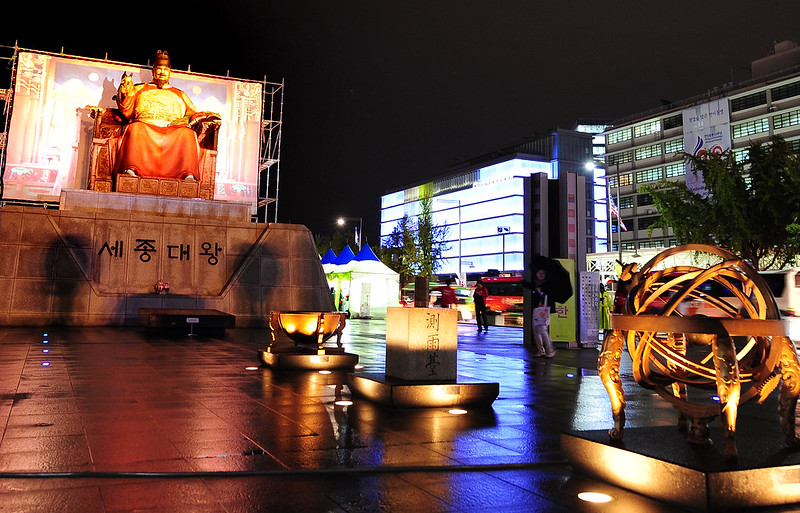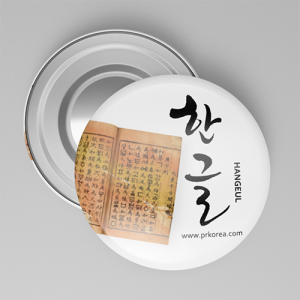
King Sejong Statue in Gwanghwamun Square, Seoul.
Take a moment to think about the various holidays your country celebrates. There are independence days, holidays to celebrate workers, religious holidays, holidays dedicated to notable historical figures, and probably hundreds more.
But does your country have a national holiday declared just for its writing system?
 Hangeul (한글) is the official writing system of the Republic of Korea, created by King Sejong the Great in the 15th century as a replacement for the classical Chinese characters that were used up until then. Not only did he wish to create a writing system that better reflected the sounds of spoken Korean language, but he also worked tirelessly to create a system that was accessible to everyone. Those of lower class who did not have access to the proper education necessary to learn classical Chinese characters were left illiterate, and King Sejong made it his goal to rid his country of illiteracy and make language accessible to everyone. Therefore, hangeul is more than just a tool to write messages and thoughts. It is a symbol of King Sejong’s love for the Korean people and his commitment to unite them through language.
Hangeul (한글) is the official writing system of the Republic of Korea, created by King Sejong the Great in the 15th century as a replacement for the classical Chinese characters that were used up until then. Not only did he wish to create a writing system that better reflected the sounds of spoken Korean language, but he also worked tirelessly to create a system that was accessible to everyone. Those of lower class who did not have access to the proper education necessary to learn classical Chinese characters were left illiterate, and King Sejong made it his goal to rid his country of illiteracy and make language accessible to everyone. Therefore, hangeul is more than just a tool to write messages and thoughts. It is a symbol of King Sejong’s love for the Korean people and his commitment to unite them through language.
Hangeul Day was established in order to celebrate King Sejong’s meaningful creation that has helped shape Korean culture and society as we know of it today, as well as to commemorate the invention of such a unique and scientific writing system.
Hangeul Day is an official national public holiday that is commemorated each year on October 9. However, it was not always like this. The decision to celebrate Hangeul Day on October 9 and also make it a national public rest day is the result of much deliberation and many changes, creating a timeline that is filled with twists and turns.
If we wish to take a closer look at this timeline, we need to go back to the year 1926. This year marked 480 years since hangeul was proclaimed by King Sejong through his publication titled <Hunminjeongeum> (훈민정음, which can be translated as “the proper sounds for teaching the people”), a manuscript that detailed the exact use and creation of the letters of hangeul. Scholars made the claim that hangeul was officially proclaimed through <Hunminjeongeum> on September 29, 1446 following the lunar calendar. Deciding to continue to use the lunar calendar to celebrate this day, November 4, 1926 was calculated to be the modern equivalent of hangeul’s proclamation day, and so the first celebration of hangeul commenced on November 4.
At that time, the day was called “Gagya Day” (가갸날), in reference to how people learned the alphabet back then by reciting each consonant with the various vowels: ga, gya, geo, gyeo (가 갸 거 겨) and so on and so forth. The name was officially changed to “Hangeul Day” (한글날) in 1928.
The debate continued in the year 1934 when it was decided that the solar calendar should be adopted in place of the lunar calendar, which had made determining a fixed date for Hangeul Day rather complicated. With some debate over whether the Julius calendar or the Gregorian calendar should be used, it was decided to utilize the Gregorian calendar, and Hangeul Day continued to be celebrated on the fixed date of November 4 each year after.
 It was not until after Korea’s liberation in 1945 from Japanese colonial rule that Hangeul Day was moved to its current date of October 9. This occured after the discovery of new information documented in <Hunminjeongeum Haerye> (훈민정음 해례), which was a supplemental publication written by scholars under King Sejong that went into more detail in explaining hangeul and its creation. According to this publication, <Hunminjeongeum> was released within the first ten days of September in the year 1446. It was decided to take the last day of this period, September 10, and convert it to the Gregorian solar calendar, resulting in the now familiar date of October 9.
It was not until after Korea’s liberation in 1945 from Japanese colonial rule that Hangeul Day was moved to its current date of October 9. This occured after the discovery of new information documented in <Hunminjeongeum Haerye> (훈민정음 해례), which was a supplemental publication written by scholars under King Sejong that went into more detail in explaining hangeul and its creation. According to this publication, <Hunminjeongeum> was released within the first ten days of September in the year 1446. It was decided to take the last day of this period, September 10, and convert it to the Gregorian solar calendar, resulting in the now familiar date of October 9.
The year after in 1946, Hangeul Day was officially declared a public holiday, marking 500 years since hangeul was proclaimed by King Sejong.
However, its status of public holiday was stripped away in 1990 after it was decided that there were too many public holidays that would only impede the nation’s march towards rapid industrial development, and it was demoted simply to an anniversary date. But groups that tasked themselves with the promotion of hangeul argued that something as monumental as the writing system’s creation deserved much more than just a simple anniversary and began efforts to have the day reestablished as a national holiday.
Thanks to their tireless efforts, Hangeul Day was once again declared an official national public holiday in 2012, going into effect on Wednesday, October 9 in 2013 with its observance as a public rest day. It has been observed without fail ever since, with 2021 marking 575 years since hangeul’s proclamation in 1446.
Hangeul Day not only commemorates King Sejong’s astounding invention, but also serves to remind us how something as simple as a handful of letters can unite a nation and create a foundation for even more innovation and advancement.
How will you celebrate Hangeul Day?
Written by : Allison Garbacz
From Illinois, United States. Current 5th-year undergraduate at the University of Wisconsin-Madison, B.A. Candidate for Linguistics, B.A. Candidate for Asian Languages and Cultural Studies, Exchange student at Korea University, Intern at VANK (Voluntary Agency Network of Korea)